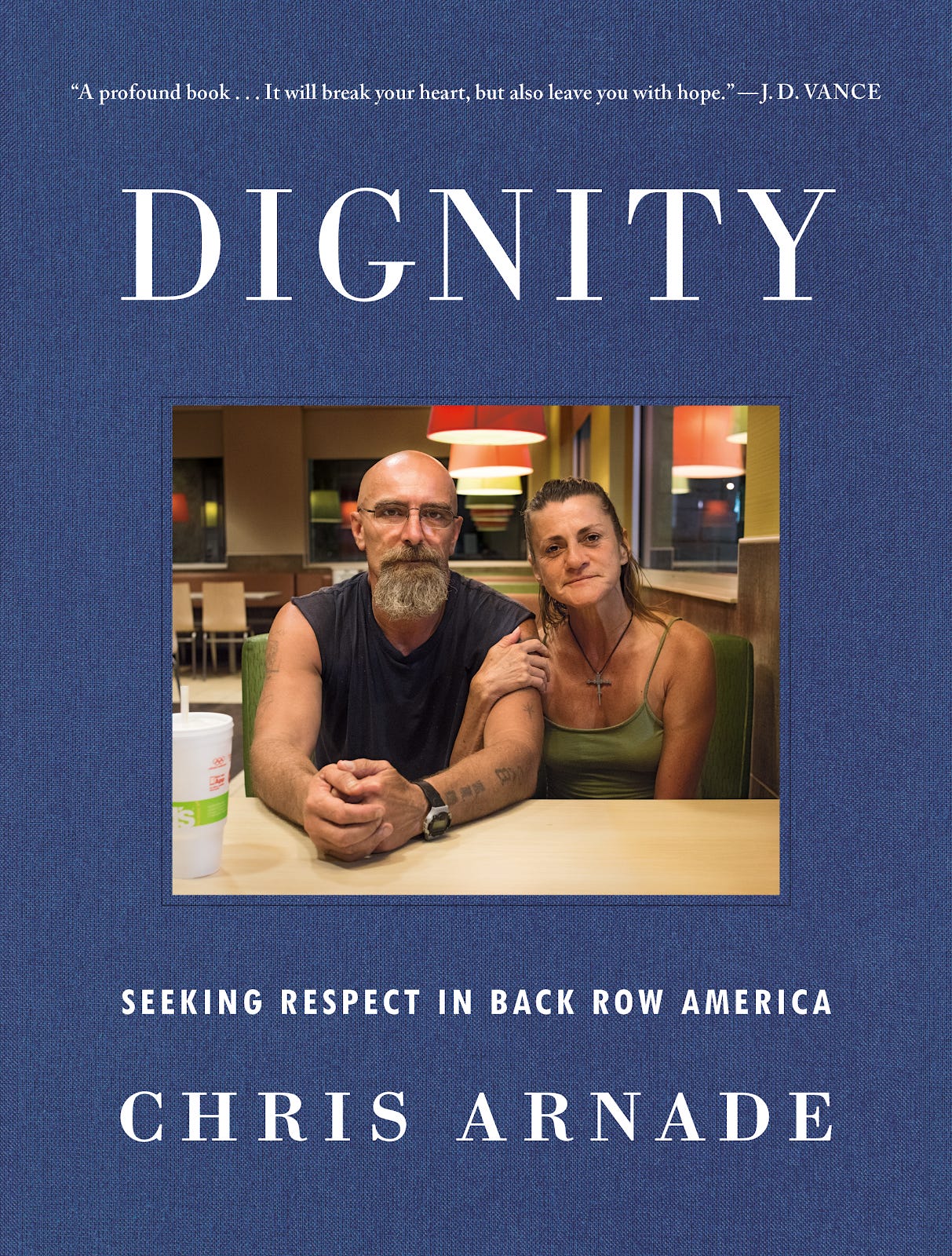Journalists Are Reporting Their Colleagues To HR For Expressing Political Opinions That Make Them Feel Unsafe (Updated)
A disturbing story

(Update, 5/15/2019: This post has been edited substantially — it originally included a story I later found out to be significantly more complicated than what I reported, and which I subsequently decided to remove entirely. There’s a full explanation of what happened here, and for transparency’s sake you can read an untouched, archived version of the original post here.))
In Today’s Newsletter
-Journalists Are Reporting Their Colleagues To HR For Expressing Political Opinions That Make Them Feel Unsafe (short feature)
-Book Giveaway: Dignity: Seeking Respect in Back Row America by Chris Arnade (short)
-My Podcast, Singal-Minded Conversations, Has A Home (short)
-Happy Birthday, Alex (short)
Journalists Are Reporting Their Colleagues To HR For Expressing Political Opinions That Make Them Feel Unsafe
Here’s a story that took place at a major media outlet within the last year which I find pretty concerning. I hope people don’t overextrapolate and assume that what I’m about to describe is the norm, but to my mind, it provides evidence that certain social trends I have often written off as just being the province of Tumblr culture or “crazy college students,” and therefore okay to ignore — especially given the risk that paying undue attention to them could incite conservative backlash — are creeping into journalism.
I don’t have permission to share the full details — doing so could potentially cause further difficulty for the individual who was targeted. So I’m leaving out the name of of the target and the publication involved, but if you follow online journalism at all closely, you have heard of the outlet in question. I do have permission to share the basic outlines of what happened, and I think it’s important to do so.
‘Bob,’ a staffer at the publication in question, wrote a piece about a simmering social-justice controversy in which he staked out a position — I’d call it center-right — at odds with the progressive consensus. I wish I could give more details, but I cannot. I am positive that the column in question expresses what is, in an American context, a mainstream view on the controversy. If surveyed, most Americans would likely agree with its general thrust.
Bob’s fellow staffers intensely disliked his take on this particularly controversy. So a number of them filed coordinated HR complaints against Bob accusing his column, filed remotely (Bob, like an increasing number of journalists, does not work from his outlet’s office), of making them ‘unsafe’ — I am told that was the word that was used by the complainants. I don’t know exactly how they wanted the situation to be rectified, but I do know that, definitionally, any HR complaint made by one employee against another brings with it the threat of punishment, and the use of the term ‘unsafe’ suggests that the staffers leveling the complaint were so upset and disturbed by Bob’s center-right column that they felt their physical or psychological safety had been threatened.
Bob was informed of the complaints against him by one of his bosses and, he told me, never had any direct interactions with HR. The ‘case’ just sort of fizzled out, though it appears the higher-ups at Bob’s publication took it seriously and heard out the complainants respectfully.
Because the journalist at the center of this story was never actually punished or got that entangled with HR, I imagine this is where naysayers will pop up and say that I’m making too big a deal out of an isolated incident that didn’t really go anywhere. I disagree. I’d ask anyone tempted to wave off this story whether they would apply the same logic to a situation I reported on last year in which a CUNY graduate student, because he had angrily criticized Israel on a listserv, was forced into a meeting with administrators there, who strongly implied he could be punished because his remarks had made a fellow student — let’s all say it in unison — “feel unsafe” (she also found it ‘triggering’). If Palestine Legal hadn’t gotten involved and provided him with free representation, helping to get the administrators to back off, it’s unclear what would have happened. Does it make sense to say “He wasn’t punished, so who cares?”
No. The mere involvement of local ‘authorities,’ whether school administrators or HR or whoever else, in adjudicating mainstream political disagreement can of course have a chilling effect on people’s expression of their political beliefs. So it’s really important that such disagreement be viewed as out of bounds when it comes to the purview of a given institution’s disciplinary apparatus.
That’s particularly vital in journalism. If you’re a journalist, seeking the truth, and expressing what you view as the truth, is your job. And I know Bob was disturbed by what happened to him, even if he wasn’t officially sanctioned in any way. He continues to write for his publication but now knows that there are colleagues of his who may report him to HR for expressing opinions — which is his job — if they once again become convinced that his work has put them in physical or psychological jeopardy.
This story found its way to me as a result of social and professional networks — I’m by no means all that connected within journalism. So I would imagine there are other stories like them out there, too, that I don’t have access to. Off the top of my head, I’m aware of one similar incident I already tweeted about: At The Intercept, as I explained in November, a group of staffers complained that they had been ‘traumatized,’ or language to that effect, by a photo essay about far-right women published by Topic, another First Look Media publication. This isn’t exactly the same thing, because as far as I know there was no HR complaint, but it’s the same general idea: staffers complaining that they found the work or opinions of their colleagues ‘traumatizing,’ or that it made them “feel unsafe.”
There are, unfortunately, progressive and leftist communities where this shockingly immature and ill-conceived idea that disagreement is the same as abuse or trauma has truly taken hold, but it’s completely inimical to the core tenets of journalism, and I hope it doesn’t spread further there. If you’ve experienced anything like this at a journalism outlet, or have heard other stories like this second- or third-hand, please reach out.
Book Giveaway: Dignity: Seeking Respect in Back Row America by Chris Arnade

I’m really looking forward to reading this, and I have a request out to have Arnade on my podcast:
Widely acclaimed photographer and writer Chris Arnade shines new light on America's poor, drug-addicted, and forgotten--both urban and rural, blue state and red state--and indicts the elitists who've left them behind.
Like Jacob Riis in the 1890s, Walker Evans in the 1930s, or Michael Harrington in the 1960s, Chris Arnade bares the reality of our current class divide in stark pictures and unforgettable true stories. Arnade's raw, deeply reported accounts cut through today's clickbait media headlines and indict the elitists who misunderstood poverty and addiction in America for decades.
After abandoning his Wall Street career, Arnade decided to document poverty and addiction in the Bronx. He began interviewing, photographing, and becoming close friends with homeless addicts, and spent hours in drug dens and McDonald's. Then he started driving across America to see how the rest of the country compared. He found the same types of stories everywhere, across lines of race, ethnicity, religion, and geography.
Send an email with the subject line ‘backrow’ to singalminded@gmail.com. I’ll pick two emails at random and the winners will each receive a copy when the book comes out next month. And just a friendly reminder that whenever I do a book drawing, I reserve at least one extra copy for paid subscribers — they’ll have a chance to enter another drawing on Wednesday.
My Podcast Has A Home
The early download numbers for my new podcast, Singal-Minded Conversations, have been good given that I hadn’t even given it a formal home, gotten it on any podcast apps, and so forth — it’s only been available via this newsletter. So I’m formalizing things a bit: The podcast is now ‘officially’ hosted on Fireside, at http://singalmindedconvos.fireside.fm. The RSS feed is here, and so far it’s available on Stitcher, Spotify, and iTunes, with more platforms to come. In the meantime, if you’re using a platform the podcast isn’t yet on, remember that you can manually add it via its RSS feed (I think! I’m bad at this!). And I’ll continue sending out every new episode via this newsletter as well.
If you enjoy Singal-Minded and are interested in the subjects I cover, but can’t or don’t want to spring for a paid subscription to the newsletter, subscribing and listening to this podcast is a perfect way to support my work in a tangible way. Obviously as things progress I’ll try to make the production a little slicker and sand down various rough edges, but I’m quite pleased with the episodes I’ve released so far, and there are a lot more to come: I’ll be conducting interviews with the journalist Wesley Yang about his sizzling Twitter thread about the sorry present state of liberal journalism, Boston Globe columnist Michael Cohen about his new book with Micah Zenko about scaremongering foreign-policy arguments, my friend Randolph Brickey about his work as a public defender, Buck Angel about trans rights and his career as an adult film star, and Nicholas Christakis about his new book, Blueprint: The Evolutionary Origins of a Good Society, and the campus controversy he and his wife Erika became embroiled in at Yale.
Subscribe, subscribe, subscribe!
Happy Birthday, Alex
“I’M RUINED!”
Questions? Comments? Suggestions that this newsletter is not the best venue for family in-jokes? I’m at singalminded@gmail.com or on Twitter at @jessesingal. The lead image, of a baby who is feeling very unsafe, is by Shelbey Miller, via Unsplash.


This article makes me feel unsafe! But who will I report you to? My spouse, maybe, which is myself since I just married myself. That's called 'Sologamy' and really is a thing. Look it up. Anyway, I'm the only person who exists in my reality, which is the only reality, so you don't have to worry, or do anything, or even exist.
>I’ll be conducting interviews with the journalist Wesley Yang about his sizzling Twitter thread about the sorry present state of liberal journalism, Boston Globe columnist Michael Cohen about his new book with Micah Zenko about scaremongering foreign-policy arguments, my friend Randolph Brickey about his work as a public defender, Buck Angel about trans rights and his career as an adult film star, and Nicholas Christakis about his new book, Blueprint: The Evolutionary Origins of a Good Society, and the campus controversy he and his wife Erika became embroiled in at Yale.
I'm curious about if there's some sort of "common knowledge" in media about podcast releases. The common knowledge on YouTube is that regularly scheduled releases is a proven, effective method of having YouTube feature your content to your subscribers, and therefore be blessed by the algorithm and the money it brings. In contrast, Netflix assumes binge-watching, with all episodes released simultaneously and consumed in succession.
Will you produce and release podcast episodes in some regular regiment, or will you release them the moment they're done (regardless of if they're produced all in rapid succession)? Is there some kind of reasoning behind it (revenue stream or viewership reasons)?